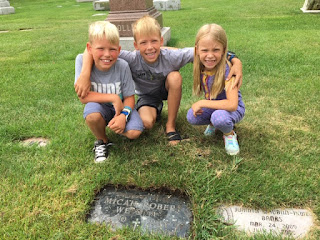“Under-promise
and over-deliver.” With the guidance of mentors, I have tried
to implement this business proverb into my law practice. But what of those who don’t seem to mind
over-promising? Are we willing to rely
upon their boasts? When it comes to
faith, are we willing to take a chance on God, even though many of us have been
abused by the unmet promises of salesman whose follow-up mantra is, “buyer
beware,” and “all sales final.”
Today, July 27th, marks the 12th
anniversary of the death of our oldest son Micah. As we mark yet another year without him, a
friend and fellow grieving dad and I recently contemplated how we would
interact with our deceased sons once we see them again in heaven. Specially, how will they appear to us? Will our sons appear the age of when they
died on earth, or the age that they would be now, on earth, if they had not
died? More generally, will we even
recognize our son? What information will
they already have, and what will we need to catch them up on?
I have low expectations for the coffee I (rarely) buy at a
gas station. I try to keep my
expectations reasonable when it comes to my kids’ behavior, school and sport
performance. I am a relatively
easy-to-please consumer. The “cost” to
me of these expectations is relatively low, because I did not give up much in
return. I have not staked my life
satisfaction on these expectations. But
when it comes to my expectations for the results of significant suffering, such
as the death of my son, I have extremely high expectations.
God makes audacious claims for those who stick it out in
faithfulness to him and remain faithful to the end. God has promised an eternity to us, his
faithful children, that is currently uncontemplated for even the most
imaginative of human minds. In his first
letter to the Corinthians, Paul writes, “No
eye has seen, nor ear heard, nor the heart of man imagined, what God has
prepared for those who love him.” 1
Corinthians 2:9.
In Revelation 21:3-6, we read about Jesus’ bold, unmatched
claims, claims that will either lead to us being the most pitiable of all mean
for trusting in His promises, or be met in unspeakable glory for their grand
fulfillment. “And I heard a loud voice from the throne saying, “Behold, the dwelling
place of God is with man. He will dwell
with them, and they will be his people, and God himself with be with them as
their God. He will wipe away every tear
from their eyes, and death shall be no more, neither shall there be mourning,
nor crying, nor pain anymore, for the former things have passed away. And he who was seated on the throne said,
Behold, I am making all things new….to the thirsty I will give from the spring
of the water of life without payment. ”
In Fyodor Dostoyevsky’s novel, Brothers Karamazov, the main
character Ivan Karamazov, attempts to make sense of suffering. About the end result of our suffering, we
says, “I believe like a child that suffering will be healed and made up for,
that all the humiliating absurdity of human contradictions will vanish like a
pitiful mirage….that in the world’s finale, at the moment of eternal harmony,
something so precious will come to pass that it will suffice for all hearts,
for the comforting of all resentments, for the atonement of all the crimes of
humanity, of all the blood that they’ve shed; that is will make it not only
possible to forgive but to justify all that has happened.”
I expect that in the world’s finale we will not have a
collective memory purge of our sufferings, but a full recognition of the
meaning and purposes of our sufferings. God’s
“making all things new” will show us the meaning to our deepest sufferings,
such deep and profound meaning that each and every one of us will be glad for
how God worked through suffering. We
will see how God has so orchestrated all of human existence, between human
relationships and events, across thousands and thousands of years, that our
suffering will turn out for God’s glory and our good.
If I were to die now, I imagine a game of baseball catch
with my 13-year old son. We would play
under the shade of the cherry tree we planted in Minneapolis the summer after
he died, having full knowledge of the pain that his death caused us, but by
reason of the demonstrated goodness of God, knowing that God’s redemptive
purposes made the pain worthwhile. While
we have wept a thousand times for our Micah, we shall live ten thousand times
ten thousand years together in eternity.
And not just us, but all of us can live in high expectations
of God’s redemptive purposes. Each of us
will say, about our individual and collective sufferings, “Yes, it was worth it
all, in the end.” Our losses during a finite lifespan will ultimately be viewed
like finite drops of water in an infinite ocean. How much more significant are the
relationships forged through the fire of affliction in contrast to a few years
of life lived in relative ease. I fully
expect that God will over-deliver on His promises, even with such audacious claims.





